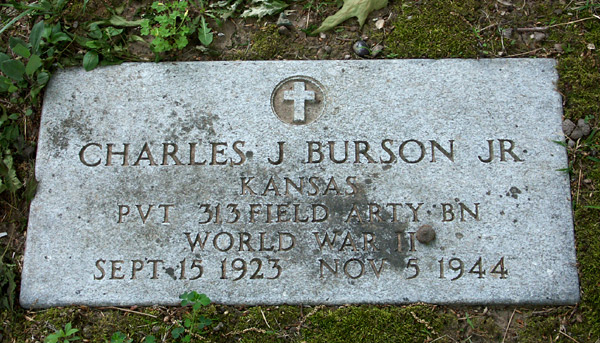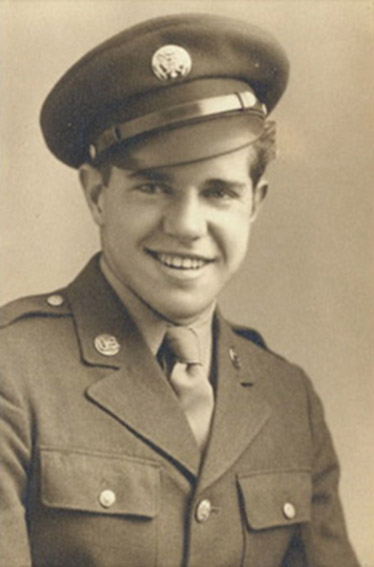Charles J. Burson Jr.
Date of Birth: September 15, 1923
Place of Birth: Holden, Missouri
Father and Mother’s Names: Charles Burson, Sr. and Anna Durland
Service Branch: Army
Rank/Specialty: Private
Service ID: TBD
Division/Company/Unit info: 313th Field Artillery Battalion, 80th Division.
Riley Connection: Enumerated 1925, 1930 and 1940 in Manhattan, Kansas while he Lived at 215 S. 5th St.
Date of Death (and Age): November 5, 1944 (age 21). Death listed as NBD (Non-Battle Death).
Place of Death: Moselle, France
Grave Location: Originally burried in France (location unclear). Re-interred at Sunset Cemetery, Manhattan, KS on August 30, 1948.
Bio: TBD
Unit Combat Record: On July 15, 1942, the 80th Division was again ordered into active service. Major General Joseph Dorch Patch, the Division Commander, issued General Order No. 1 to reactivate the 80th Division. Initially, soldiers reported to Camp Forrest, Tennessee, named for General Nathan Bedford Forrest, a famous Confederate cavalry commander in the Civil War. The Division later moved for training at Camp Phillips, near Salina, Kansas and in the California-Arizona Desert Training Center (known today as Fort Irwin).
The 80th Division set sail aboard the SS Queen Mary on July 4, 1944, landing a few days later on July 7 at Greenock, Firth of Clyde, Scotland. The arrival of the 80th Division in England brought the European Theater of Operations total of U.S. Divisions to 22: 14 infantry, 6 armored, and 2 airborne.
The Division proceeded south to Northwich, England via trains for additional training. Training included learning how to waterproof equipment for the upcoming channel crossing. The Division crossed the English Channel in LSTs and Liberty Ships landing in Normandy on Utah Beach shortly after noon on August 2, 1944, D-Day + 57 and assembled near St. Jores, France. A few days later on August 8, 1944, the 80th was initiated into battle when it took over the LeMans bridgehead in the XX Corps area.
By the end of the war, May 7, 1945, the 80th Division had seen 277 days of combat. It had captured 212,295 enemy soldiers. The 80th Division returned to the United States in January 1946, after spending time in Europe helping to restore and keep peace after the war. The 80th Division had been one of the stalwarts of Patton's Third Army, but it cost them dearly. During their 277 days of combat, the 80th Infantry Division had 17,087 casualties.
On August 5, 1944, the 80th landed at Utah Beach. The division was destined to become the "work horse" of General Patton's Third Army and to play a key role in the breakthrough at Avranches. The Division then attacked Argentan, taking it August 20, and creating the Falaise Pocket. After mopping up in the area, the 80th took part in the Third Army dash across France, cutting through Saint-Mihiel, Châlons, and Commercy in pursuit of the retreating Germans until stopped by the lack of gasoline and other supplies at the river Seille.
From September 25 to November 7, the division maintained an aggressive defense of positions west of the Seille, and prepared for the Third Army sweep into the industrially vital Saar Basin. The attack jumped off on November 8, the 80th advancing through Delme Ridge, Faulquemont, and St. Avold to within 5 miles (8.0 km) of Saarbrücken, when it was relieved by the 6th Armored Division December 7 1944.
The information available for this veteran is incomplete. We would like to include as much information about all our veterans as possible, so if you or someone you know has any additional information we encourage you to either use the submission link below or contact us at: peacememorial101@gmail.com. Thank you for your support.

